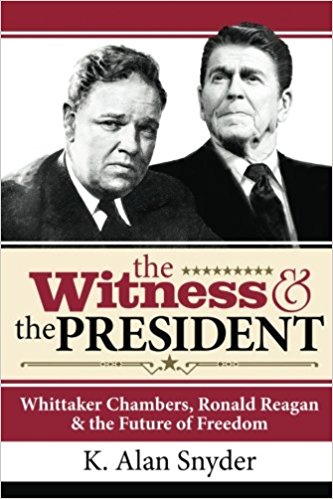As I ponder the current crisis in Ukraine, instigated by a Russian despot, I think back to what I wrote in a book I published in 2015. The aim of The Witness and the President was to analyze the lives and beliefs of Ronald Reagan and Whittaker Chambers and try to figure out which man was more correct about the future of freedom. Reagan was the supreme optimist. That doesn’t mean he didn’t see threats clearly, but he had faith and hope, as he put it more than once, that “the march of freedom and democracy” would leave Marxism-Leninism “on the ash-heap of history.”
Chambers, on the other hand, was much more pessimistic. He warned the world about the threat of communism (and all totalitarianism) with his autobiography, Witness, which I consider one of the treasures of the twentieth century. He spoke and wrote in the hope that people would listen, but often commented to friends that he felt that Western Civilization might be too far gone to care anymore. If you are interested in that theme and how those two conservative icons compare, here is a direct link to the book.
In light of Vladimir Putin’s latest gambit in seeking to overthrow the Ukrainian government and re-create his rather incorrect view of “greater Russia,” I went back to my final chapter in the book to review what I said about Putin from a 2015 perspective. It rings true with what we see transpiring today.
Expectations were high that Russia could be transformed into a stable commonwealth. The reality is that Russian nationalism came to the forefront and political leaders such as Vladimir Putin attempted to reestablish Russian power. The Washington Post’s former correspondents in Moscow authored a book detailing the demise of freedom in Russia. They wrote of the “Putin Project,” which was an attempt to get rid of all challenges to his authority. The Post’s review of the book noted that the authors have provided “a powerful indictment of Putin’s years as president. In his obsessive quest for control and a stronger Russian state, Putin is undermining Russia’s long-term future just as Soviet leaders did in their own repressive days.”
One British diplomatic source warned, “Putin wants a strong Russia, and Western dependence on it for oil and gas supplies is a key part of his strategy. He no longer cares if it upsets the West.” Meanwhile, The New Yorker, hardly a bastion of conservative thought, devoted an article to suspicious deaths of some of Putin’s critics.
The view from 2015 carries into 2022. The “Putin Project” continues unabated, albeit he now has most of the nations of the world condemning him. Yet he really doesn’t care what others think. And suspicious deaths of political opponents have not stopped. He is a totalitarian, pure and simple.
I go back to my quest in the book: what about the future of freedom?
With respect to Reagan and Chambers, I concluded this:
What is the conclusion then? Which of these conservative icons was more accurate in predicting the future of freedom? It is not a matter of either one being completely right or completely wrong. Ronald Reagan saw a reality in his day: communism robbed the people of their spirit; it denied the freedom for which a growing number was clamoring; it was teetering on the edge of financial ruin and something had to change. He took action, both in word and deed and in tandem with other like-minded leaders, that helped push the doddering old philosophy and its seed over the brink. He rightly rejoiced in the fall of the Soviet Union. Whittaker Chambers might have concluded the same as Reagan if he could have witnessed the march of events in the 1980s. Yet he would not have allowed the fall of communism in Russia to make him euphoric. He knew a deeper problem was still with the human race, a problem that continues even today—is our faith going to rest in Man or in God?
What about the future of freedom today? The tides of history shift constantly. Yet one thing remains constant—the deeper problem. Is our faith going to rest in Man or in God?


